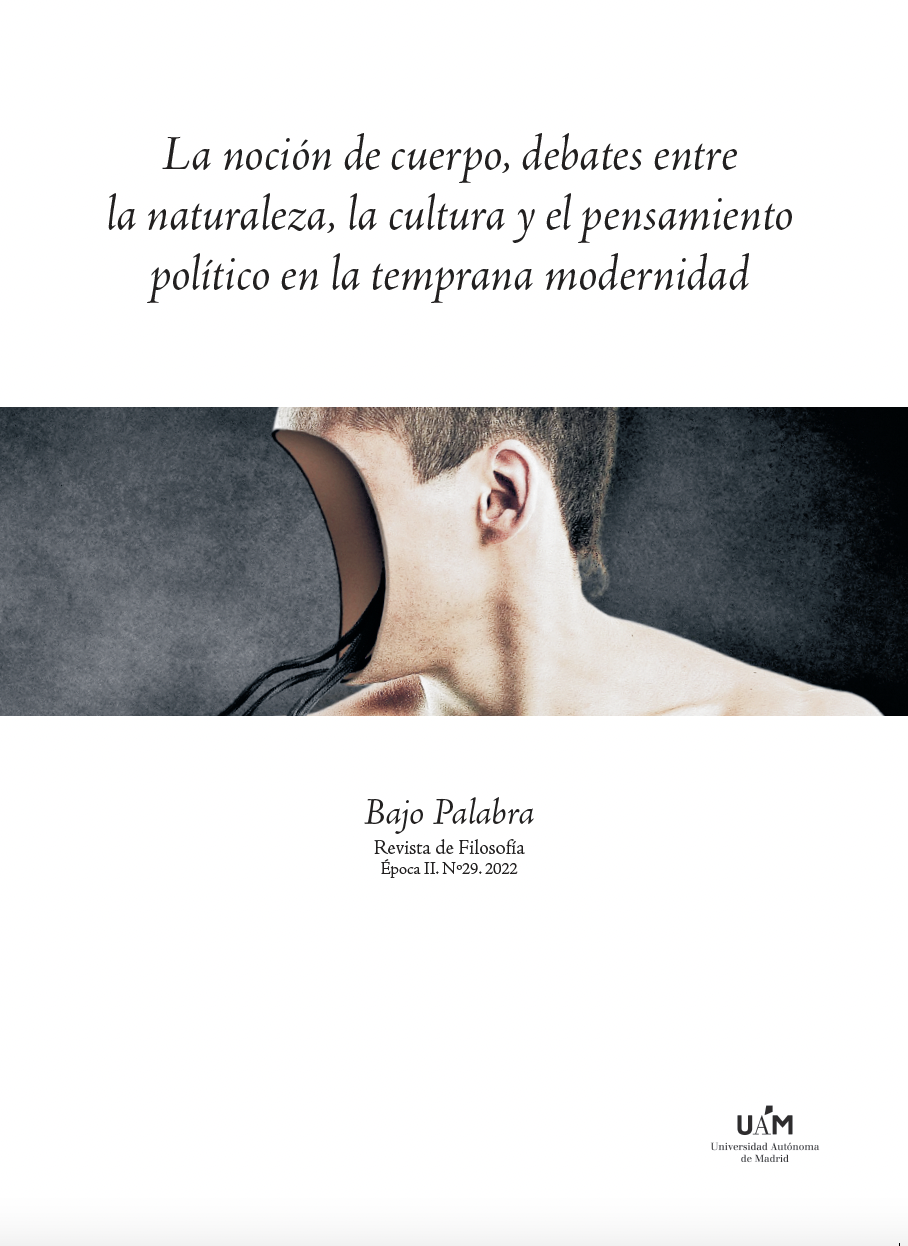La jerarquía de seres, de cuerpos y almas, en The True Intellectual System de Cudworth
Parole chiave:
Ralph Cudworth, jerarquía, unión cuerpo y almaCopyright (c) 2022 Natalia Soledad Strok

TQuesto lavoro è fornito con la licenza Creative Commons Attribuzione 4.0 Internazionale.
Abstract
En este artículo me propongo comprender
la necesidad la unión entre alma
y cuerpo en la jerarquía de seres que
propone Ralph Cudworth en The True
Intellectual System (1678). Así se apreciarán
los distintos tipos de cuerpo y las
diversas configuraciones de la sustancia
inmaterial, que mostrará distintos grados
de consciencia que se pueden adquirir y
la armonía que rige en la metafísica de
nuestro filósofo. Por último, intentaré
dar cuenta de consecuencias en el plano
político en el marco de su filosofía.
Downloads
Riferimenti bibliografici
Allen, K. (2013). Cudworth on Mind, Body and Plastic Nature, Philosophy
Compass 8/4, pp. 337–347. DOI: https://doi.org/10.1111/phc3.12026
Andrault, R. (2014). What is Life?: A Comparative Study of Ralph Cudworth
and Nehemiah Grew. Nachtomy, O. y Smith, J. (Eds.), The Life Sciences in Early
Modern Philosophy (pp. 29-46). Oxford University Press. DOI: 10.1093/acprof:
oso/9780199987313.001.0001
Armour, L. (2008). Trinity, Community, and Love: Cudworth’s Platonism and
the Idea of God. Hedley, D. y Hutton, S. (Eds.), Platonism at the Origin of Modernity
(pp. 113-130). Springer. DOI: 10.1007/978-1-4020-6407-4_8
Blackwell, C. (2011). Neo-Platonic modes of concordism versus definitions of
difference: Simplicius, Augustinus Steuco and Ralph Cudworth versus Marco
Antonio Zimara and Benedictus Pererius. Clucas, S., Forshaw, P. y Rees, V.
(Eds.), Laus Platonici philosophi: Marsilio Ficino and his influence (pp. 317-
. Brill. DOI:
https://doi.org/10.1163/ej.9789004188976.i-384.55
Breteau, J.-L. (2008). Chaos and Order in Cudworth’s Thought. Hedley, D. y
Hutton, S. (Eds.), Platonism at the Origin of Modernity (pp. 131-146). Springer.
DOI: 10.1007/978-1-4020-6407-4_9
Burden, M. (2019). Ralph Cudworth’s Freewill Manuscripts: A Roadmap to
Dating and Analysis. The Cambridge Platonist Research Group. https://cprg.
hypotheses.org/815.
Carter, B. (2011). The Little Commonwealth of Man: The Trinitarian Origins of
the Ethical and Political Philosophy of Ralph Cudworth. Peeters.
Cassirer, E. (2002). Individuum und Kosmos in der Philosophie der Renaissance.
Die Platonische Renaissance in England und die Schuel von Cambridge. Felix Meiner
Verlag.
Cudworth, R. (1678). The True Intellectual System of the Universe. Richard Roystan.
Cudworth, R. (1845). The True Intellectual System. Thomas Tegg.
Cudworth, R. (1996). A Treatise Concerning Eternal and Immutable Morality:
With A Treatise of Freewill (Sarah Hutton, Ed.). Cambridge University.
Darwall, S. (1995). Cudworth: obligation and self-determining moral Agency.
The British Moralists and the Internal ‘Ought’: 1640-1740 (pp. 109-148). Cambridge
University Press. DOI: https://doi.org/10.1017/CBO9780511608957.006
Hutton, S. (1997). Cudworth, Boethius, and the Scale of Nature. Rogers, G.
A. J.; Vienne, J. M. y Zarka, Y. C. (Eds.), The Cambridge Platonists in Philosophical
Context: Politics, Metaphysics and Religion (pp. 93-100). Springer. DOI:
1007/978-94-015-8933-8_6
Hutton, S. (2016). Salving the phenomena of mind: energy, hegemonikon,
and sympathy in Cudworth. British Journal for the History of Philosophy, 25(3),
pp. 465-486, DOI: https://doi.org/10.1080/09608788.2016.1185601
Hutton, S. (2020). Ralph Cudworth: Plastic Nature, Cognition, and the Cognizable
World. Dominik Perler y Sebastian Bender (Eds.), Causation and Cognition
in Early Modern Philosophy (pp. 105-122). Routledge.
Leech, D. (2017). “Cudworth on superintellectual instinct as inclination to the
good”, British Journal for the History of Philosophy, 25 (5), pp. 954-970. DOI:
https://doi.org/10.1080/09608788.2017.1330188.
Leisinger, M. (2019). Animals, Freewill, and Animal Freewill: a Development
in Cudworth’s Freewill Manuscripts. The Cambridge Platonist Research Group.
https://cprg.hypotheses.org/830.
Leisinger, M. (2021). Cudworth on Freewill, Philosophers’ Imprint, 1, pp. 1-25.
Mahoney, E. (2007). Marsilio Ficino and Ralph Cudworth on the Hierarchy of
Beings. Simonutti, L. (Ed.), Forme del neoplatonismo (pp. 321-333). Olschki.
DOI: https://doi.org/10.1400/188913
Passmore, J. A. (1951). Ralph Cudworth. An Interpretation. Cambridge University
Press.
Pécharman, M. (2014). Cudworth on Self-Consciousness and the I Myself, Vivarium
, pp. 287-314. DOI: https://doi.org/10.1163/15685349-12341278
Plotin (1990). Traité sur la liberté et la volonté de l’Un [Ennéade VI, 8 (39)]. Intr.,
texto griego, trad. y notas de G. Leroux. Vrin.
Strok, N. (2018). El enigma de Ralph Cudworth en la historia de la filosofía.
Revista Anales del Seminario de Historia de la Filosofía 35 (2), pp. 357-373. DOI:
https://doi.org/10.5209/ASHF.59659
Strok, N. (2021) La unidad de la sustancia inmaterial en Ralph Cudworth.
Tópicos. Revista de Filosofía de Santa Fe, 42, pp. 216-242. DOI: https://doi.
org/10.14409/topicos.v0i42.10695
Waddell, M. (2021). Magic, Science, and Religion in Early Modern Europe. Cambridge
University Press. DOI: https://doi.org/10.1017/9781108348232
